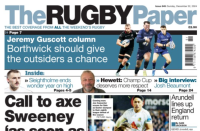 Like the scene from Titanic after the ship hit the iceberg, the relegation of London Welsh has seen many of those associated with the club jump overboard before the inevitable happens.
Like the scene from Titanic after the ship hit the iceberg, the relegation of London Welsh has seen many of those associated with the club jump overboard before the inevitable happens.
Relegation is never certain until the season is over, as Leeds can confirm when they survived in 2002 because of the deficiencies of Rotherham’s facilities.
However, it is highly unlikely that London Welsh will be that lucky – especially after their own successful sidestep in 2012 of a similar exclusion – and as such, the many backroom staff they put in place to run a Premiership team is a luxury that as a Championship team they cannot afford, so better to make the cuts now than face financial ruin later.
Unless, like an established relegated Premiership club, they are given a substantial parachute payment and the extra payment that the Premiership foundation members get.
Although London Welsh will get a parachute payment they won’t get the long-term dividend payments that foundation members do and therefore, in my opinion, they are wise to cut their cloth according to the league that they will be joining next season – particularly after losing their disillusioned long-term financier Kelvin Bryon.
His stinging criticisms of Premier Rugby Ltd (PRL) and the RFU are to be expected, first because London Welsh had to struggle to gain entry to the Premiership, despite winning promotion and then again, after suffering the five-point deduction that effectively cemented their relegation at the hands of the same groups.
By pointing out that PRL had a representative on the tribunal which decided the eventual punishment for the Tyson Keats affair, as a potential conflict of interest given their stance on the promotion of London Welsh, he has highlighted an area of serious concern that should be looked at by RFU legal officer Caroline Fleck.
Although it is tough on London Welsh, the truth is they would probably have gone down no matter what, but both the PRL and the RFU should take a long, hard look at the way they run the Premiership and how the unethical financial model used, has driven a wealthy investor out of the game.
Owners have walked away in the past causing dramatically damaging consequences for their clubs including big names such as Richmond, Rotherham, West Hartlepool and London Scottish among others.
Some, like Wasps have been lucky and found other investors but as the figures in last week’s paper showed, it takes a special sort of person to invest in a rugby club given that they are liable to have years of pumping money into the club they choose, before having the slightest chance of seeing a profit.
A combined operating loss of £17.7m, (which is likely to increase when Wasps and Newcastle finally register their accounts) is bad news for the sport, particularly as the accounts are for the 2011 World Cup year.
I am a little puzzled by Premiership Rugby chief executive Mark McCafferty saying that the 2011 World Cup had a significant negative impact on all the clubs financial results. You would expect that a World Cup would encourage significantly more people to want to watch the game!
I could understand a negative impact if it was taking place here and matches were scheduled at the same time as the Premiership games, but it was in New Zealand with matches taking place at an ungodly hour of the morning and so should have encouraged all the newly generated rugby fans to beat a path to their local Premiership clubs to watch live games at civilised times.
However, more interestingly than his comments, were the figures showing the percentage of staff costs (players wages mainly) which were well over half of all the clubs turnovers, with a majority far higher than 65 per cent.
While leaders Saracens spent a whopping £7.5m of a turnover of just £7.8m which means they only had £300,000 left for costs like stadium hire, marketing, catering etc. makes their operating loss of just £2m seem remarkably small.
Collectively, the Premiership must be hoping that the BT Vision deal stays close to the trumpeted £38m a year, despite the fact that unless ERC agree – which considering they have a deal with BSkyB is unlikely – they won’t be able to offer the European portion of the contract and may not have an alternative competition to fill the gap.
The BT Vision contract is vital to the future of the Premiership but it is also fundamental to the new television service offered by BT as major part of planned rugby coverage which includes French Top 14 matches and also the IRB World Series Sevens.
As BT holds a huge mountain of cash and can, if they want, easily outbid any of the current providers it is beholden on the sport to deliver a better product and bring more of their money into the game – hopefully at all levels.
If the Premiership can get the ‘product’ right and have the right mix of local and cross-border competitions, it could make BT a driving force in televised rugby which in turn will hopefully increase the value of the Premiership ‘product’ thereby helping to move the Premiership closer to balancing the books.
2 Comments
Leave a Comment
You must be logged in to post a comment.























Pingback: auto swiper
Pingback: รับทําโฆษณา Google